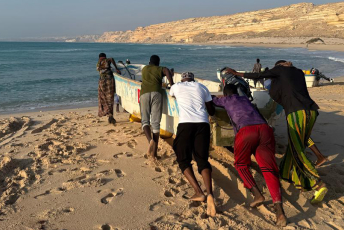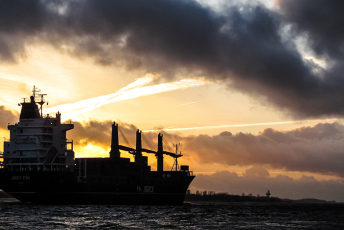Launched in 2018, Kenya’s US$3.6 billion Ports Master Plan will see the country expanding, upgrading, and developing its sea, lake and dry ports over the next 30 years. Ports that are modern and comply with the International Maritime Organisation (IMO) codes are better able to attract a greater share of the goods shipped around the world. This is a critical factor in boosting and sustaining the economy of Kenya and the region. However, with these expansions comes security concerns. These issues were the focus of discussions at a strategic meeting between ISS ENACT’s East African Regional Organised Crime Observatory and the Kenya Ports Authority (KPA) Security Services Department in July 2021.
The KPA’s flagship project is the new Lamu Port, which commands an initial investment of US$2.1 billion. It’s one of the seven mega infrastructure development projects under the Lamu Port-South Sudan-Ethiopia-Transport (LAPSSET) Corridor Project. This US$25 billion programme forms part of Kenya Vision 2030, which aims to transform the country into a middle-income economy.
Lamu Port serves as a transshipment facility to other seaport hubs such as in Djibouti, South Africa and the United Arab Emirates. Transshipment ports are intermediate facilities where goods are unloaded from one ship and loaded to another to continue to other destinations. Lamu is located close to the border of Somalia, where the al-Shabaab terrorist group is a dominant presence and notoriously focuses on state infrastructure, damaging property and fostering fear in the communities. This is starkly demonstrated in the overrunning of the Manda Bay Airfield in Lamu in January 2020.
Al-Shabaab is known to employ organised crime activities directly and through collaboration with transnational organised crime groups to fund its organisation and terror activities. To this end, al-Shabaab reportedly smuggles legal commodities such as sugar, and is also involved in trading in illicit firearms and human trafficking, including recruitment drives in Kenya. In 2019, the Government of Kenya banned trade between Kenya and Somalia through the Kiunga border point and closed its border with Somalia due to insecurity. This was also done to counter the existing syndicates that deal illegal fishing, human trafficking, contraband goods and ‘terror merchants’. Despite the state efforts to open up business in Lamu at the Kiunga border point, evidence of organised crimes near the port persists.
In April 2020, the government of Kenya torched 12 tonnes of dry fish worth USD 45,000 (KES 5,000,000) smuggled from Somalia to Kenya. The Kenyan Coast Guard based in Lamu further torched khat worth USD 222,000 (KES 25,000,000) that was headed to Somalia from Kenya. And as much as piracy has subsided in the Indian Ocean off Africa’s east coast, an ‘increase of shipping traffic due to the Lamu Port may ignite the interest in the hijacking of ships – a crime al-Shabaab has been indirectly involved with in the past,’ a security maritime research expert, speaking anonymously, told ENACT.
Lamu Port’s susceptibility to insecurity and infiltration by organised criminal and terror groups could be exacerbated by grievances felt by the local population. Historical marginalisation of communities and the recent state excesses in the war on terror, such as extrajudicial killings and enforced disappearances, has at times targeted members of communities living in Lamu. Al-Shabaab takes advantage of such grievances in recruiting its members from Lamu. Jaysh al-Ayman is an al-Shabaab unit based in Lamu’s Boni forest. Its founder and leader is a Kenyan national who appears on the United Nations Security Council sanctions list and is held responsible for the Manda Bay Airfield attack.
Beside links to terror groups, in 2018, Lamu was noted as a drug trade hotspot. As a link to South Sudan and Ethiopia, the port presents an opportunity to expand the drug trafficking route to markets in Northern Kenya and neighbouring East African states. Lamu Port and other LAPSSET infrastructure, such as the railway to Juba and Addis Ababa and the Isiolo Airport in Kenya, are equally vulnerable to an array of trafficking, including in wildlife and endangered tree species such as teak, and minerals.
Port security experts told ENACT that concerted efforts by port stakeholders and users had led to the establishment of Border Management Committees. These committees bring together key government agencies. They focus particularly on maritime security concerns in Lamu, such as the smuggling of contraband goods and the link between human trafficking and terrorism.
The committees aim to implement a coordinated response between the KPA and other state actors, including the police, Kenya Coast Guard Service, Immigration Department, and Kenya Revenue Authority. The Border Management Committees have also incorporated Lamu’s local communities to enable intelligence gathering and collection, thus enhancing public participation in security-related decision-making.
However, Kibwana notes that the absence of the KPA integrated maritime security policy and strategy still hinders inter-agency responses to emerging transnational organised crime cases, especially at newer ports such as Lamu. The maritime security policy and strategy that is in early development would seek to enhance the KPA’s response to transnational organised crime. This policy and strategy would also extend KPA’s cooperation with other government agencies such as the Kenya Coast Guard Service and the Kenya Navy to deter off-shore transnational maritime threats.
Safe ports stimulate local, national and regional economies, benefiting both the public and private sectors. As such, it is paramount to secure ports to address transnational organised crime. Recent developments indicate that Kenya is making strides to securing ports and its maritime space. The country has recently been removed as a High-Risk Area by the IMO due to its achievements in addressing piracy challenges.
An immediate, positive consequence of this is reduced insurance and security expenses (by millions of dollars annually) for those using Kenya’s ports. This aligns well with the Ports Master Plan to make Kenya an attractive and competitive transshipment and destination hub on Africa’s East Indian Coast.
Mohamed Daghar, Regional Coordinator, Eastern Africa, ENACT Project, ISS, Willis Okumu, Senior Researcher, ENACT Project, ISS, and Denis Ombuna Simon, Principal Security Enforcement Officer, Kenya Ports Authority







